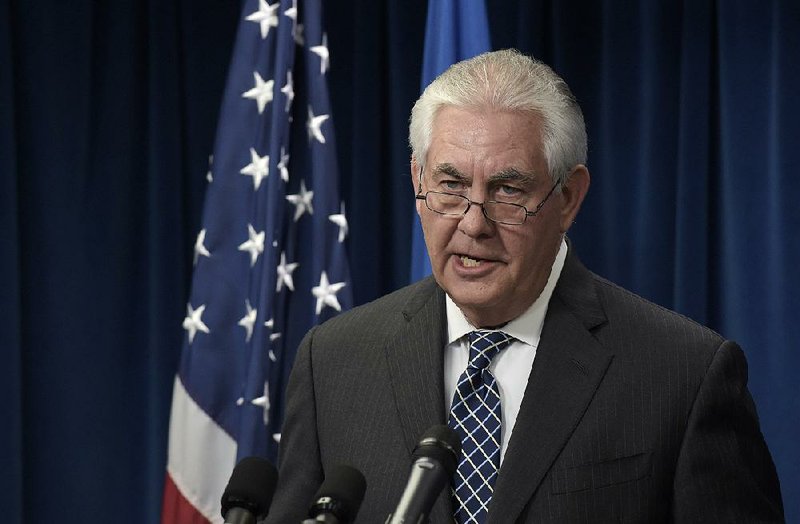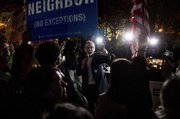WASHINGTON -- President Donald Trump signed a new travel ban Monday that administration officials said they hope will end legal challenges over the matter by imposing a 90-day ban on the issuance of new visas for citizens of six majority Muslim nations.
In addition, the nation's refugee program will be suspended for 120 days, and it will not accept more than 50,000 refugees in a year, down from the 110,000 cap set by President Barack Obama's administration.
Trump signed the new ban out of public view, according to White House officials. The order won't take effect until March 16, despite earlier warnings from Trump that any delay would put national security at risk by allowing the entry of people who want to harm the country.
The new guidelines mark a departure from Trump's original ban. They lay out a more specific national security basis for the order, block the issuance of only new visas, and name just six of the seven countries included in the first executive order, omitting Iraq.
[PRESIDENT TRUMP: Timeline, appointments, executive orders + guide to actions in first 100 days]
The order also details specific sets of people who would be able to apply for case-by-case waivers to the order, including those previously admitted to the United States for "a continuous period of work, study, or other long-term activity"; those with "significant business or professional obligations"; and those seeking to visit or live with family.
"This executive order responsibly provides a needed pause, so we can carefully review how we scrutinize people coming here from these countries of concern," Attorney General Jeff Sessions said in announcing that the order had been signed.
Even before the ink was dry, though, Democrats and civil-liberties groups asserted that the new order was legally tainted in the same way as the first one.
"While the White House may have made changes to the ban, the intent to discriminate against Muslims remains clear," said New York Attorney General Eric Schneiderman, a Democrat who had joined the legal fight against the first ban. "This doesn't just harm the families caught in the chaos of President Trump's draconian policies -- it's diametrically opposed to our values and makes us less safe."
[U.S. immigration: Data visualization of selectedimmigration statistics, U.S. border map]
Omar Jadwat, director of the ACLU's Immigrants' Rights Project, said: "The only way to actually fix the Muslim ban is not to have a Muslim ban. Instead, President Trump has recommitted himself to religious discrimination, and he can expect continued disapproval from both the courts and the people."
State Department, Homeland Security and Justice Department officials defended the new order as a necessary measure to improve public safety. They said the countries implicated -- Iran, Sudan, Somalia, Libya, Syria and Yemen -- were either state sponsors of terrorism, or their territories were so compromised that they were effectively havens for terrorist groups. Iraq was omitted, Secretary of State Rex Tillerson said, because it is an "important ally in the fight to defeat ISIS" -- the Islamic State -- and its leaders had agreed to implement new security measures.
A Department of Homeland Security official, speaking on the condition of anonymity on a call with reporters, said Iraq was "treated differently" in part because the country had agreed to "timely repatriation" of its citizens if they were ordered deported from the United States.
The new order provides other exceptions not contained explicitly in previous versions: for travelers from those countries who are legal permanent residents of the United States, dual nationals who use a passport from another country and those who have been granted asylum or refugee status. Anyone who holds a visa now should be able to get into the country without any problems, though those whose visas expire will have to reapply, officials said.
The order claims that since 2001, hundreds of people born abroad have been convicted of terrorism-related crimes in the United States, and that more than 300 people who entered the country as refugees were the subject of counterterrorism investigations.
It cites two specific examples: Two Iraqi nationals who came to the United States as refugees in 2009, it says, were convicted of terrorism-related offenses, and in October 2014, a Somali native who arrived in the country as a child refugee was sentenced to 30 years in prison for plotting to detonate a bomb at a Christmas tree-lighting ceremony in Oregon. That man became a naturalized U.S. citizen.
"We cannot risk the prospect of malevolent actors using our immigration system to take American lives," Homeland Security Secretary John Kelly said.
U.S. officials declined to specify the countries of origin of the 300 refugees now being investigated in terrorism cases, and they declined to detail those individuals' current immigration statuses.
A Department of Homeland Security report assessing the terrorist threat posed by people from the seven countries covered by Trump's original travel ban had cast doubt on the necessity of the executive order, concluding that citizenship was an "unreliable" threat indicator and that people from the affected countries have rarely been implicated in U.S.-based terrorism.
The Department of Homeland Security official speaking on condition of anonymity criticized the report as being incomplete and not vetted with other agencies, and he asserted that the administration should not be pressed by the judiciary to unveil sensitive national security details to justify the ban.
"This is not something that the Department of Justice should have to represent to a federal district court judge," the official said.
The more sweeping immigration order in January inspired protests across the country as travelers en route to the United States were detained at airports after the surprise order was announced. The State Department had provisionally revoked tens of thousands of visas all at once.
Officials sought to dismiss the idea that there would be any confusion surrounding the implementation of the new order. Officials said they delayed implementation so the government could go through the appropriate legal processes and ensure that no government employee would face "legal jeopardy" for enforcing the order.
"You should not see any chaos, so to speak, or alleged chaos, at airports. There aren't going to be folks stopped tonight from coming into the country because of this executive order. If they are, it's pursuant to our ordinary screening procedures," the Department of Homeland Security official said. "We're going to have a very smooth implementation period."
"It's much clearer about how it doesn't apply to groups of immigrants with more clearly established constitutional rights," said University of Texas law professor Stephen Vladeck. "That's a really important step."
House Speaker Paul Ryan commended the administration and Kelly "for their hard work on this measure to improve our vetting standards."
"This revised executive order advances our shared goal of protecting the homeland," Ryan said.
A federal district judge in Washington state first suspended the travel ban Feb. 3, and a three-judge panel of the U.S. Court of Appeals for the 9th Circuit later upheld that freeze.
On Monday, Washington state's attorney general said his office is considering its "next legal steps" concerning the administration's new travel order.
"By rescinding his earlier executive order, President Trump makes one thing perfectly clear: His original travel ban was indefensible -- legally, constitutionally and morally," Attorney General Bob Ferguson said in a statement.
"The president has capitulated on numerous key provisions blocked by our lawsuit, including bans on Green Card holders, visa holders and dual citizens, an indefinite ban on Syrian refugees, and explicit preferences based on religion," he said. "We are carefully reviewing the new executive order to determine its impacts on Washington state and our next legal steps."
Tourism takes hit
Trump's immigration stance has begun to discourage foreign visits to major U.S. cities, threatening to cost billions of dollars and thousands of jobs, according to travel industry and city representatives.
They blamed global protests after Trump's Jan. 27 ban, as well as high-profile customs ordeals -- such as the detention of Australian children's author Mem Fox at Los Angeles International Airport and the interrogation of boxer Muhammad Ali's son in Fort Lauderdale, Fla.
New York, the nation's most-visited city by people overseas, predicted that such trips will drop more than 2 percent this year to 12.4 million, the first decline after eight consecutive annual increases.
For Miami, which is second to New York in overseas visitors to U.S. cities, flight searches from the U.K. "have fallen off a cliff," down 52 percent from last year, according to a Feb. 27 report by Kayak.co.uk, an online booking agent.
Los Angeles could lose about 800,000 international visitors and $736 million in spending over the next three years "as a direct result" of Trump's orders, mostly because of reduced travel by Mexican nationals, said Ernest Wooden, president of the Los Angeles Tourism & Convention Board, which based its estimate on research provided by Tourism Economics in Wayne, Pa., which analyzes data to predict and measure travel activity for clients in government and private industry.
International visitors spent about $250 billion in the U.S. last year, Tourism Economics President Adam Sacks said. The U.S. will have about 4.3 million fewer foreign visitors because of Trump policies, which translates into $7.4 billion of lost revenue, according to his firm.
Commerce Department spokesman Tim Truman said he couldn't comment on the travel industry's worries until May, when the federal government receives data on January's international arrivals.
Information for this article was contributed by David Nakamura, Matt Zapotosky and Abigail Hauslohner of The Washington Post; by Henry Goldman, Andrea Wong, David Biller, Hui-Yong Yu and Mary Schlangenstein of Bloomberg News; by Alicia A. Caldwell, Jill Colvin, Julie Pace and Sadie Gurman of The Associated Press; and by Jaweed Kaleem of Los Angeles Times.
A Section on 03/07/2017

